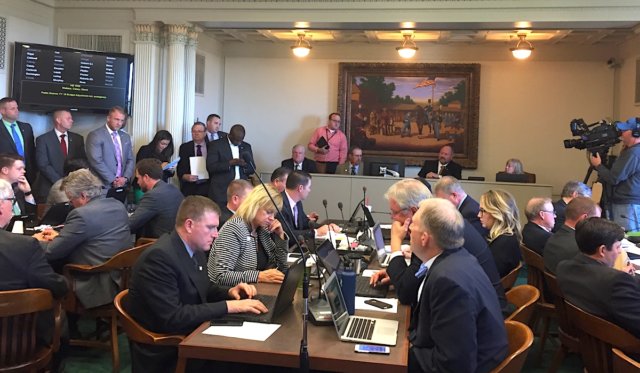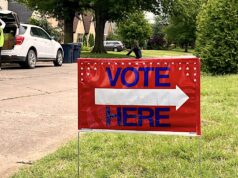

“If I have to come back and present this bill 20 different times, all day and all night until we get it across the goal line, I will. I think it’s that important.”
Rep. Michael Rogers (R-Broken Arrow) stood before members of the House Joint Committee on Appropriations and Budget and told Rep. Eric Proctor (D-Tulsa) that if the GOP’s new revenue agreement fails Wednesday on the House floor, he will continue to fight for his bill that raises teacher pay.
HB 1036 would initiate a $3,000 raise for Oklahoma teachers, effective Aug. 1, 2018. The bill does not adjust the minimum teacher pay scale as several of Rogers’ previous proposals had.
“A $3,000 teacher raise all of a sudden makes us competitive,” Rogers said in his office after the bill passed JCAB. “We have great benefits here for teachers in the state. If we can couple that with a good salary, we have an opportunity to go out and recruit quality teachers and retain quality teachers.”
Rogers discussed how a member of his family received an incentivized offer to teach in Texas after graduation, and he discussed his time as the superintendent of a private school in the Tulsa area.
“We paid less than the public schools. We had to offer other things — smaller class sizes and some of those things,” Rogers said. “Recruiting teachers is tough. The reality is, everybody’s looking for a quality teacher, and quality teachers normally don’t leave the school they are at. So when one is available, you’ve got to have the resources to go get them.”
HB 1036 passed 18-9, the same by which HB 1035, the GOP’s revenue bill, passed minutes earlier. Democrats and hard-line conservative Republicans opposed both measures.
Rep. Dunnington on teacher raise: ‘The funding is not available’
“I know that we both agree that teachers need a raise, and I know that we both want that to happen. Unfortunately, again in this teacher-raise opportunity, it’s contingent upon funding. But we know the funding is not available,” said Rep. Jason Dunnington (D-OKC). “Moments ago when there was debate on the actual revenue portion of the bill, it was publicly offered by the floor leader to the Democratic Party that there would be a vote on 5 percent GPT if we would agree to vote for the revenue package. So I would like to publicly offer now that if we could put 5 percent GPT into the revenue package, the Democratic Party would like to support this bill so that we can actually raise the revenue that’s needed to pay for these raises, so that we could actually give teachers the pay raise they deserve instead of continuing to offer teachers lip-service in Oklahoma.”
Dunnington was referring to House Majority Floor Leader Jon Echols (R-OKC) who promised Democrats a stand-alone vote on taking the gross production tax incentive from 2 percent to 5 percent if they supported HB 1035 (embedded below), which includes several revenue proposals.
Those items are listed here with the apportionment estimates for the remainder of fiscal year 2017-2018 in parentheses, per House JCAB Chairman Kevin Wallace (R-Wellston):
- a $1.50 tax on cigarettes ($102 million)
- modifications to tax stamp rules on cigarettes ($108,000)
- tax rate modification on “little cigars” ($152,000)
- a new tax on chewing tobacco, smokeless tobacco and snuff ($3.5 million)
- a $0.06 increase on the gas and diesel tax ($53.9 million)
- and a change to the taxation of low-point beer ($13.8 million)
Reactions to teacher raise proposal
Reactions to Tuesday’s House JCAB events belied the broad expectation among Capitol insiders that HB 1035’s revenue package will fail to receive the required 76 votes when it is heard Wednesday.
From Gov. Mary Fallin, whose statement referenced House and Senate JCAB passage of the measures:
These measures are part of the budget agreement that will help fill our budget hole for the current fiscal year as well as put Oklahoma on a more stable budget path and allow us to address the funding of core services going forward. The budget package provides much-needed pay raises for public school teachers, which I hope will begin a longer term commitment to our educators. It also includes pay raises for Oklahoma’s hard-working state employees as well as tax relief for low-income Oklahomans. I appreciate the support of both committees in approving these vital measures.
From Superintendent for Public Instruction Joy Hofmeister:
Regionally competitive teacher compensation is desperately needed if we are ever to turn around this devastating teacher shortage. I am grateful for leaders at the Capitol who share this critical goal and seek to address this important investment for increasing student outcomes. The proposed teacher pay raise is a positive step in the right direction for Oklahoma education.
HB 1035: GOP bill for new revenue
